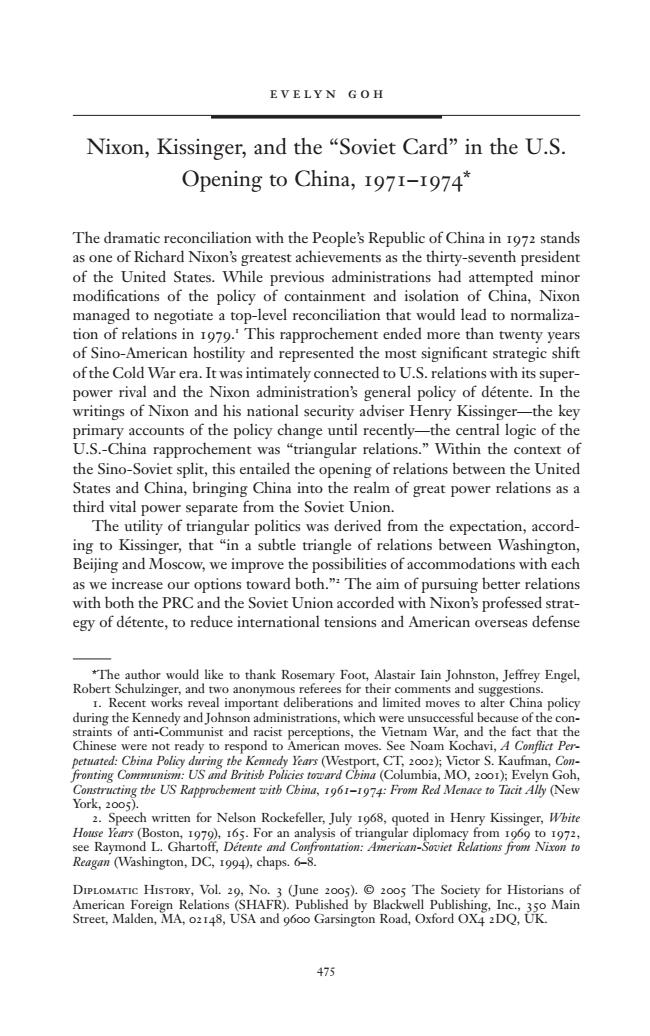正在加载图片...

EVELYN GOH Nixon,Kissinger,and the "Soviet Card"in the U.S. Opening to China,I97I-1974* The dramatic reconciliation with the People's Republic of China in 1972 stands as one of Richard Nixon's greatest achievements as the thirty-seventh president of the United States.While previous administrations had attempted minor modifications of the policy of containment and isolation of China,Nixon managed to negotiate a top-level reconciliation that would lead to normaliza- tion of relations in 1979.This rapprochement ended more than twenty years of Sino-American hostility and represented the most significant strategic shift of the Cold War era.It was intimately connected to U.S.relations with its super- power rival and the Nixon administration's general policy of detente.In the writings of Nixon and his national security adviser Henry Kissinger-the key primary accounts of the policy change until recently-the central logic of the U.S.-China rapprochement was "triangular relations."Within the context of the Sino-Soviet split,this entailed the opening of relations between the United States and China,bringing China into the realm of great power relations as a third vital power separate from the Soviet Union. The utility of triangular politics was derived from the expectation,accord- ing to Kissinger,that "in a subtle triangle of relations between Washington, Beijing and Moscow,we improve the possibilities of accommodations with each as we increase our options toward both."The aim of pursuing better relations with both the PRC and the Soviet Union accorded with Nixon's professed strat- egy of detente,to reduce international tensions and American overseas defense The author would like to thank Rosemary Foot,Alastair Iain Johnston,Jeffrey Engel, Robert Schulzinger,and two anonymous referees for their comments and suggestions. I.Recent works reveal important deliberations and limited moves to alter China policy during the Kennedy and Johnson administrations,which were unsuccessful because of the con- straints of anti-Communist and racist perceptions,the Vietnam War,and the fact that the Chinese were not ready to respond to American moves.See Noam Kochavi,A Conflict Per- petuated:Cbina Policy during the Kennedy Years(Westport,CT,2002);Victor S.Kaufman,Con- fronting Communism:US and Britisb Policies toward China (Columbia,MO,2001):Evelyn Goh, Constructing the US Rapprocbement with Cbina,1961-1974:From Red Menace to Tacit Ally (New York,2005). 2.Speech written for Nelson Rockefeller,July 1968,quoted in Henry Kissinger,Wbite House Years(Boston,1979),165.For an analysis of triangular diplomacy from 1969 to 1972, see Raymond L.Ghartoff,Detente and Confrontation:American-Soviet Relations from Nixon to Reagan (Washington,DC,1994),chaps.6-8. DIPLOMATIC HIsToRY,Vol.29,No.3 (June 2005).2o05 The Society for Historians of American Foreign Relations(SHAFR).Published by Blackwell Publishing,Inc.,350 Main Street,Malden,MA,o2148,USA and 96oo Garsington Road,Oxford OX4 2DQ,UK. 475evelyn goh Nixon, Kissinger, and the “Soviet Card” in the U.S. Opening to China, 1971–1974* The dramatic reconciliation with the People’s Republic of China in 1972 stands as one of Richard Nixon’s greatest achievements as the thirty-seventh president of the United States. While previous administrations had attempted minor modifications of the policy of containment and isolation of China, Nixon managed to negotiate a top-level reconciliation that would lead to normalization of relations in 1979. 1 This rapprochement ended more than twenty years of Sino-American hostility and represented the most significant strategic shift of the Cold War era. It was intimately connected to U.S. relations with its superpower rival and the Nixon administration’s general policy of détente. In the writings of Nixon and his national security adviser Henry Kissinger—the key primary accounts of the policy change until recently—the central logic of the U.S.-China rapprochement was “triangular relations.” Within the context of the Sino-Soviet split, this entailed the opening of relations between the United States and China, bringing China into the realm of great power relations as a third vital power separate from the Soviet Union. The utility of triangular politics was derived from the expectation, according to Kissinger, that “in a subtle triangle of relations between Washington, Beijing and Moscow, we improve the possibilities of accommodations with each as we increase our options toward both.”2 The aim of pursuing better relations with both the PRC and the Soviet Union accorded with Nixon’s professed strategy of détente, to reduce international tensions and American overseas defense 475 Diplomatic History, Vol. 29, No. 3 (June 2005). © 2005 The Society for Historians of American Foreign Relations (SHAFR). Published by Blackwell Publishing, Inc., 350 Main Street, Malden, MA, 02148, USA and 9600 Garsington Road, Oxford OX4 2DQ, UK. *The author would like to thank Rosemary Foot, Alastair Iain Johnston, Jeffrey Engel, Robert Schulzinger, and two anonymous referees for their comments and suggestions. 1. Recent works reveal important deliberations and limited moves to alter China policy during the Kennedy and Johnson administrations, which were unsuccessful because of the constraints of anti-Communist and racist perceptions, the Vietnam War, and the fact that the Chinese were not ready to respond to American moves. See Noam Kochavi, A Conflict Perpetuated: China Policy during the Kennedy Years (Westport, CT, 2002); Victor S. Kaufman, Confronting Communism: US and British Policies toward China (Columbia, MO, 2001); Evelyn Goh, Constructing the US Rapprochement with China, 1961–1974: From Red Menace to Tacit Ally (New York, 2005). 2. Speech written for Nelson Rockefeller, July 1968, quoted in Henry Kissinger, White House Years (Boston, 1979), 165. For an analysis of triangular diplomacy from 1969 to 1972, see Raymond L. Ghartoff, Détente and Confrontation: American-Soviet Relations from Nixon to Reagan (Washington, DC, 1994), chaps. 6–8